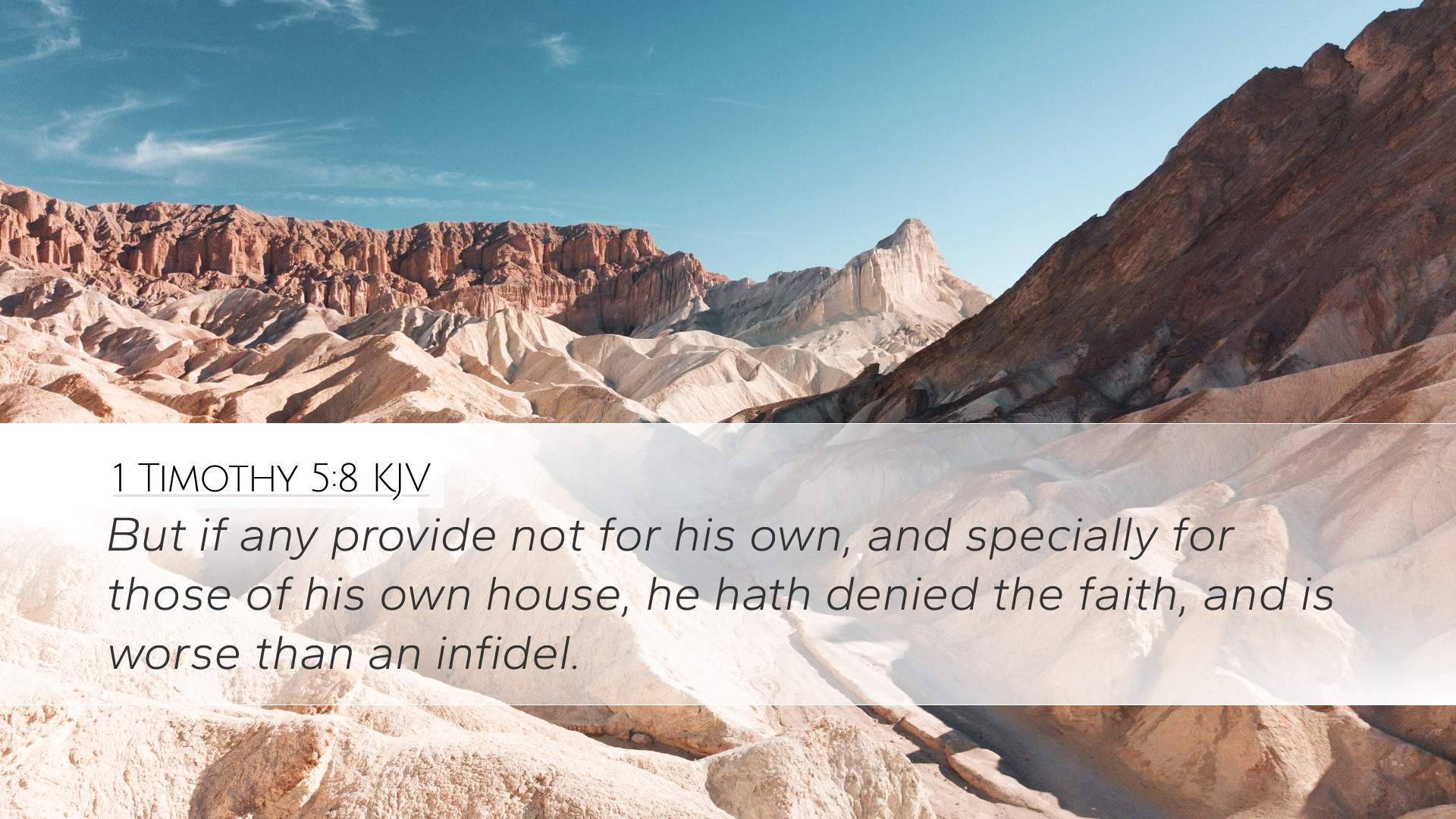Commentary on 1 Timothy 5:8
Verse Reference: 1 Timothy 5:8 - "But if any provide not for his own, and specially for those of his own house, he hath denied the faith, and is worse than an infidel."
Introduction
This verse, rich in theological implications, reflects the Apostle Paul's exhortation to the church regarding familial responsibilities. It asserts the principle that the neglect of one’s obligations to family is a serious matter, impacting one's standing in the faith. In assessing this verse, we shall draw insights from public domain commentaries, allowing us to understand its depth and application.
Contextual Analysis
Paul's instruction to Timothy must be understood within the broader context of church governance, especially concerning widows and the care of family members. Timothy is encouraged to correct various practices within the church, and this verse serves to underscore the moral responsibility of believers.
Matthew Henry's Insights
Matthew Henry emphasizes the gravity of providing for one’s family. He remarks:
- Family as Priority: The term "provide" indicates a proactive and responsible approach to ensuring the wellbeing of one’s household, which is a fundamental duty of the believer. Henry suggests that the apostle illustrates this duty as part of living out one’s faith.
- Denial of Faith: Henry notes that failing to care for one’s own family equates to a denial of the faith. This highlights a stark reality: a Christian’s actions can conflict with their professed beliefs.
- Worse than an Infidel: The use of the term "infidel" here denotes someone who does not hold to the Christian faith. To be termed worse than such a person underscores the severity of neglecting family duties.
Albert Barnes' Analysis
Albert Barnes provides a complementary perspective on the implications of this verse:
- Practical Faith: Barnes notes that true faith manifests in practical actions, particularly in how one treats their family. He suggests that ethical behavior is a reflection of faith.
- Broader Implications: The imperative extends beyond just physical provision to encompass emotional and spiritual support, reinforcing that genuine care is integral to family life.
Adam Clarke's Commentary
Adam Clarke brings further depth by addressing the cultural context of the early church:
- Social Responsibility: Clarke indicates that, in Paul’s era, family units were crucial for social stability. A failure to fulfill these responsibilities risked the integrity of family life.
- Faith versus Works: Clarke argues that this verse serves as a practical application of the faith that demands action. Mere acknowledgment of faith without corresponding action is insufficient.
Theological Implications
This verse presents significant theological considerations that resonate throughout Christian doctrine:
- Faith in Action: The connection between faith and action is central to New Testament teaching. This verse encapsulates the idea that believers will be judged by their deeds.
- Value of Family: The emphasis on familial duty speaks to the value God places on the family structure and its foundational role in society and the church.
- Consequences of Neglect: The harsh designation of being "worse than an infidel" serves as a stark warning, urging believers to prioritize their familial responsibilities as integral to their witness.
Practical Application
For pastors, students, theologians, and Bible scholars, the following applications can be drawn:
- Ministerial Care: Those in ministry should not neglect their families. A minister’s ability to serve the church is deeply intertwined with their family life.
- Teaching Responsibility: Churches should teach the importance of family responsibilities as part of their discipleship programs.
- Holistic Approach: Pastors should advocate for a holistic approach in Christian living, where spiritual growth encompasses care for one’s family.
Conclusion
1 Timothy 5:8 encapsulates essential truths about how faith is lived out in practical ways. The insights from Matthew Henry, Albert Barnes, and Adam Clarke converge to underline the necessity of providing for one's family as a reflection of faith. Engaging with this verse challenges believers to consider how they express their faith through action, particularly in the context of familial relationships. It serves as a call to live out one’s convictions with integrity and responsibility, marking a believer’s life as a testament to their faith.


